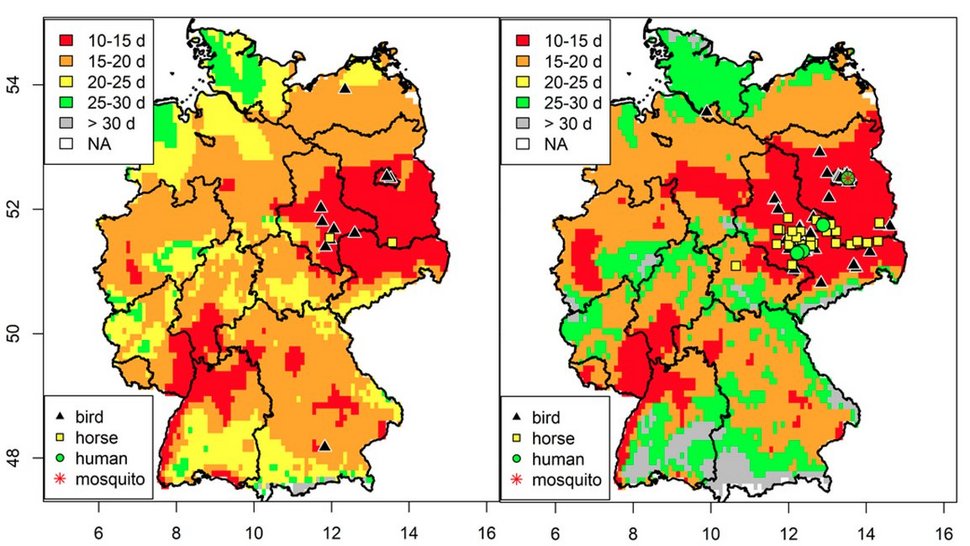Detect and manage disease outbreaks at an early stage
3 Mio. Euro für CuliFo 3, Deutschlands größtes Verbundprojekt zur Stechmückenforschung
Hamburg / Riems / Berlin, 16 February 2023 - High summer temperatures, mild winters, changing precipitation: Climate change is increasing the risk that exotic mosquitoes and the viruses they transmit will also occur in Germany. The interdisciplinary research project Culiciden- (from Culicidae, Latin for mosquitoes) Forschung (CuliFo) started its third round on 16 February with a kick-off meeting in the historic lecture hall of the Bernhard Nocht Institute for Tropical Medicine.

Which mosquito species live in Germany, which viruses can be detected in them, and what ability do mosquitoes have to transmit so-called arboviruses to humans? CuliFo is a broad collaborative project that combines field and laboratory research: Until 2016, there was no surveillance or reporting system for medically relevant mosquito species. Here, the consortium has provided important impetus in recent years. Among other things, the consortium has researched the epidemics of the Usutu virus (USUV) and the West Nile virus (WNV) in Germany (especially in birds) and for the first time also discovered human cases of the disease.
The continuation project CuliFo 3 wants to focus even more on the question of how insect-specific viruses and arboviruses in mosquitoes influence each other and what this means for their ability to infect animals and humans. In addition, the researchers want to find out what minimum infection dose is needed for mosquitoes to transmit arboviruses and for infection cycles to be maintained. Furthermore, the network wants to investigate which environmental conditions (temperature, precipitation, landscape structure) favour outbreaks. With the help of these data, the researchers want to model outbreak scenarios in order to develop environmentally compatible and sustainable control strategies.
"Our long-term goal is an improved arbovirus early warning system," says project coordinator Prof. Dr Jonas Schmidt-Chanasit. "The increase in WNV infections in Germany is worrying. And we are also concerned about the strong spread of the tiger mosquito (Aedes albopictus) in southwest Germany. What we have in mind is a surveillance system that not only detects outbreaks early, but even predicts them."
In this way, regions with a high probability of outbreak could be geographically delimited prospectively. In this way, larvae could be targeted with mosquito-specific insecticides in the breeding waters and an outbreak prevented.
![Prof. Dr Jonas Schmidt-Chanasit [Translate to English:] Prof. Dr. Jonas Schmidt-Chanasit: ein Forscher mit Glatze, der ein hellblaues Hemd trägt.](/fileadmin/_processed_/4/6/csm_Jonas_Schmidt-Chanasit_DSC_1634_1920x1080_II_1__26e5036e0b.jpg)
Representatives of all institutions involved in the research project came to the kick-off meeting on 16 February 2023 in the historic lecture hall of the BNITM. In addition to the BNITM and the FLI, these are the Carl von Ossietzky University (CvO) in Oldenburg, the Leibniz Centre for Agricultural Land Research (ZALF) in Müncheberg, the Society for the Promotion of Mosquito Control (GFS) e.V. in Speyer and the Fraunhofer Institute for Cell Therapy and Immunology (IZI) Leipzig. CuliFo 3 will receive three million euros in funding from the Federal Ministry of Food and Agriculture over the next three years.
About the project partners
The Bernhard Nocht Institute for Tropical Medicine (BNITM) is Germany's largest institution for research, care and teaching in the field of tropical and emerging infectious diseases and a member of the Leibniz Association. Current research focuses on malaria, worm infections and other parasitoses, diseases caused by arboviruses and haemorrhagic fever viruses, as well as implementation research. For handling highly pathogenic viruses and infected insects, the institute has laboratories of the highest biological safety level (BSL4) and a safety insectarium (BSL3). BNITM includes the national reference centre for the detection of all tropical infectious agents and the WHO collaborating centre for arboviruses and haemorrhagic fever viruses. Together with the Ghanaian Ministry of Health and the University of Kumasi, it operates a modern research and training centre in the West African rainforest, which is also available to external working groups. In addition, the Institute maintains numerous other collaborations in other African countries such as Gabon, Nigeria, Tanzania and Madagascar.
The Friedrich Loeffler Institute, Federal Research Institute for Animal Health (FLI) is dedicated to the health of food-producing animals. Its central tasks are the prevention, diagnosis and control of animal diseases, the improvement of animal husbandry and nutrition, and the conservation and use of animal genetic resources. Another focus is the protection of humans against zoonoses, i.e. infections transmissible between animals and humans. The FLI cooperates with numerous international organisations such as the World Organisation for Animal Health WAOH, the UN Food and Agriculture Organisation FAO, the World Health Organisation WHO and the European Food Safety Authority EFSA, also within the framework of collaboration and reference centres and reference laboratories. Direct cooperation projects are also carried out with many countries worldwide.
Contact person
Prof. Dr Jonas Schmidt-Chanasit
Head of Arbovirology/ Entomology Department
Phone : +49 40 285380-546
Email : schmidt-chanasit@bnitm.de
Julia Rauner
Public Relations
Phone : +49 40 285380-264
Email : presse@bnitm.de






